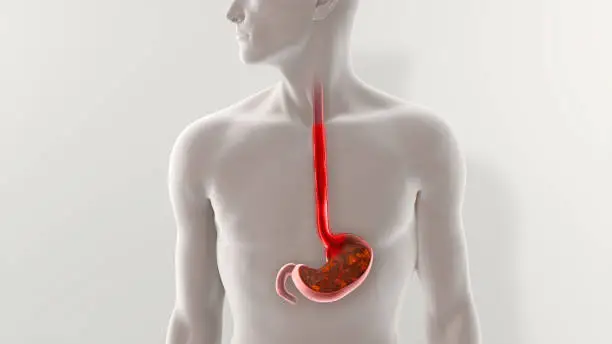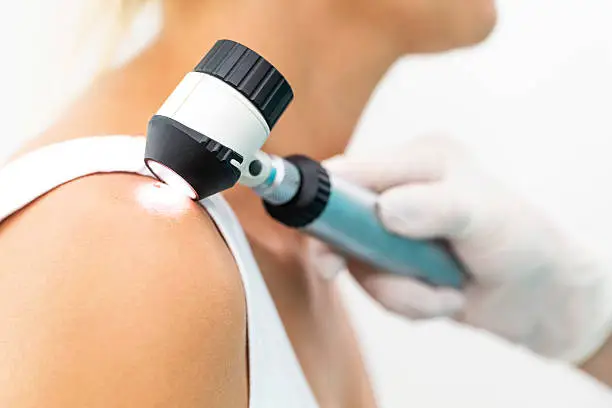Esophageal cancer is a type of cancer that starts in the lining of the esophagus, which is the muscular tube that connects the throat to the stomach. Cancer cells can grow anywhere in the esophagus, and usually start in the innermost layer and spread out.
More men than women suffer from this cancer of the esophagus. The known risk factors are tobacco use, a history of acid reflux, and old age. Esophageal cancer accounts for 1% of all cancers in the United States.

Symptoms of esophageal cancer usually do not show up until the advanced stages and often include difficulty swallowing, chest pain, and unintentional weight loss. Esophageal cancer is treatable; treatment options include surgery, chemotherapy, radiation therapy, and immunotherapy
Types
There are two primary types of esophageal cancer: adenocarcinoma and squamous cell carcinoma. The two types tend to occur in different parts of the esophagus.
Adenocarcinoma
An adenocarcinoma is one kind of cancer that develops from the gland cells producing mucus. Adenocarcinoma typically originates from the lower third part of the esophagus. However, some medical conditions such as Barrett’s esophagus are considered risk factors for the development of adenocarcinoma. Barrett’s esophagus is developed once the lower section of the esophagus becomes damaged due to a recurrent exposure of stomach acid; this occurs, for example, during acid reflux.
Adenocarcinoma may also start in the gastroesophageal (GE) junction, which is the region where the esophagus joins the stomach.
Squamous Cell Carcinoma
Squamous cell carcinoma starts in the squamous cells. The esophagus has three layers, and the squamous cells are the innermost layer. Squamous cell carcinoma can occur at any part of the esophagus but is often observed at the neck and the upper chest areas. In the United States, squamous cell carcinoma comprises less than 30 percent of all esophageal cancer cases.
Symptoms of Esophageal Cancer
Symptoms of esophageal cancer often interfere with eating and swallowing food. It is not common for cancer of the esophagus to cause symptoms early. Once cancer cells have spread the entire length of the esophagus, the following symptoms are possible
- Trouble swallowing: The most common cause of esophageal cancer is trouble swallowing, known as dysphagia. You might feel like food gets stuck in your throat. This symptom usually worsens with the advancement of the cancer.
- Vomiting: When food becomes lodged in the esophagus, you are likely to vomit. This results in an inability to eat and thus must be seen by a doctor right away.
- Chest pain: Most patients with esophageal cancer have chest pain or burning. This is usually mistaken for heartburn (acid reflux).
- Weight loss: Esophageal cancer causes difficulty in eating and a decreased appetite. Due to this, it is common to lose weight without trying.
- Chronic cough: Esophageal cancer may cause a chronic cough and hoarseness.
- Bleeding: When there is bleeding in the esophagus, then your stool will be colored black. In due course, it can lead to anemia, a deficiency of red blood cells.
- Fatigue: Anemia often involves fatigue or tiredness that persists throughout the day.
What Causes Esophageal Cancer?
The exact cause of esophageal cancer is unknown, but researchers have determined many of the risk factors. Esophageal cancer develops when there are DNA changes in the cells. Certain risk factors may cause DNA damage that leads to the genetic changes that cause cancer.
Inherited Gene Mutations
Very rarely do genetics factor into the causation of esophageal cancer cases. These are gene mutations that are hereditary or inherited from your parents by way of DNA. Genetically, the following have an association with the occurrence of esophageal cancer:6
- Tylosis: RHBDF2 gene mutation
- Bloom syndrome: Mutation of BLM gene
- Fanconi anemia: Mutation in the FANC genes
- Barrett’s esophagus :exact genes involved is not established
Discuss genetic testing and genetic counseling with your healthcare provider to learn if any of these conditions may be present in your family.
Acquired Gene Mutations
In addition to inherited gene mutations, acquired gene mutations can also impact your risk of esophageal cancer. Acquired mutations develop on their own during your lifetime and are not passed down from parent to child. These acquired mutations are often related to known risk factors
Risk Factors
There are many known risk factors for esophageal cancer. Fortunately, some of these factors can be changed to lower your risk. Risk factors for esophageal cancer include:
- age: Over 85% of esophageal cancer cases are found in people older than age
- Sex: Men are much more likely to be diagnosed with esophageal cancer than women.
- Tobacco use: The more a person uses tobacco products, the higher the risk of esophageal cancer. Smoking at least one pack per day doubles the risk of esophageal cancer.
- Reflux: People with gastroesophageal reflux disease (GERD) have stomach acid that moves up the esophagus. This often leads to heartburn and pain. GERD raises the risk of adenocarcinoma.
- Barrett’s esophagus: This is a condition that is caused by the exposure of the lower esophagus to stomach acid for an extended period. It replaces the squamous cells with gland cells and thus increases the chances of adenocarcinoma of the esophagus.
- History of cancer: History of oropharyngeal, oral cavity, or lung cancers is associated with a risk of esophageal cancer. This might be because smoking is an established cause of all these types of cancer.
- Obesity: A person with obesity has a higher risk of developing adenocarcinoma. They also are at a higher risk for GERD.
- Diet: Consuming large amounts of highly processed meats may increase the risk of esophageal cancer.
- Physical activity: Lack of physical activity is linked to an increased risk of esophageal cancer.
- Achlasia: This is a disorder in which the muscle of the bottom of the esophagus fails to relax. Consequently, food and liquids cannot pass easily into the stomach; this stretches the esophagus and irritates its cells.
- Tylosis: Tylosis is a rare condition that leads to the development of growths in the esophagus and increases the risk of squamous cell carcinoma.
- Lye exposure: Lye is a chemical substance that is present in some household cleaners. Inadvertent consumption of lye damages the esophagus and increases the risk of cancer.
- Human papillomavirus (HPV): A past diagnosis of HPV increases the risk of various cancers including throat, anal, cervical, and esophageal.
Diagnosis
There are several tests for diagnosis of esophageal cancer. Most cases of esophageal cancer are identified through a person noticing symptoms and visiting their healthcare provider.
When you visit your doctor, they will begin with an elaborate history and physical. They will ask about the onset of your symptoms and for how long you have experienced them. Your doctor will also ask if your symptoms have worsened over time. Lastly, they will conduct a physical examination to check for cancerous signs.

They may refer you to an oncologist, which means a medical doctor who specializes in cancer.
The diagnostic processes for esophageal cancer include imaging tests and will involve
- Barium swallow test: Shows abnormal areas in the esophagus
- Computed tomography (CT) scan: To see if cancer of the esophagus has spread to nearby organs
- Magnetic resonance imaging (MRI): Determines whether cancer cells have spread to the brain or spinal cord
- Positron emission tomography (PET) scan: To detect cancer cells in the esophagus
An endoscopy is a kind of test that uses a flexible tube with a small camera to visualize the esophagus and take biopsies if needed. Types used to diagnose esophageal cancer may include the following:
- Upper endoscopy: Determines if there are abnormal areas of the esophagus
- Endoscopic ultrasound: Determines the size and extent of esophageal cancer
- Bronchoscopy: Detects if cancer cells have spread to the trachea and bronchi (breathing tubes)
- Biopsy: Test tissues from the esophagus for cancer cells.
Treaths Esophageal Cancer.
For esophageal cancer treatment, several treatment procedures. The proper treatment is available for you and mainly according to the type and category of esophageal cancer, and also upon health. Most of them in cancer treatment depend on advanced degrees so that there will not occur any major damage after diagnosis.
Esophagectomy in surgery, this surgical practice is removing a specific segment of the esophagus part.
- Radiation therapy destroys tumor and cancerous cells found at one of these energy X-rays places using strong radiation sources.
- Chemotherapy: Chemotherapy applies powerful drugs that can break down cancerous cells. It can be given concurrently with radiation therapy.
- Opening of the esophagus: Laser therapy or electrocoagulation may be applied to break a tumor (a mass of cancerous cells) in the esophagus and maintain the lumen of the esophagus open and free.
- Immunotherapy: Immunotherapy is applied to enhance the body’s immune response in fighting against cancer cells.
- Targeted therapy: Targeted therapy uses drugs and other substances to mark cancer cells so that they are easier to identify and destroy.
Prevention
Esophageal cancer cannot always be prevented. However, it is possible to lower your risk by avoiding certain risk factors.
Smoking and not exercising regularly are common risk factors for esophageal cancer.
National Cancer Institute. Esophageal cancer prevention.
Avoiding these factors will lower your risk of developing esophageal cancer. Talk to your healthcare provider if you need support quitting smoking.
Research studies demonstrate that using NSAIDs might reduce the risk of developing esophageal cancer. Nonetheless, chronic use of NSAIDs has been associated with heart disease, stroke, and bleeding disorders.14 Talk to your healthcare provider before beginning a new NSAID program.
Comorbid Conditions
Comorbid conditions refer to medical conditions that can be at an increased risk of being developed when suffering from esophageal cancer. A study carried out in 2019 showed that typical comorbid conditions with esophageal cancer are heart diseases, hypertension, pulmonary disease, and diabetes.
This does not imply that esophageal causes these conditions. It only means that people with esophageal cancer are likely to experience these other conditions as well. This may be due to the fact that having obesity raises the risk of esophageal cancer and its common comorbidities.
Living With Esophageal Cancer
The goal is remission in esophageal cancer treatment. Mostly, esophageal cancers do not cause symptoms even at the early stages of it. Therefore, they are discovered usually in later stages wherein treatment is more difficult as well. The 5-year survival rate for an esophageal cancer is reported to be 60%.
Many patients with esophageal cancer can be cured and live healthy lives. After you complete treatment for esophageal cancer, you will continue to see your healthcare team periodically. It is essential to inform your oncologist immediately if you experience any new symptoms or concerns. They may advise you on a routine schedule of imaging studies to check for any recurrence of cancer cells.
It may be quite difficult to live with some of the symptoms of esophageal cancer. Inability to swallow properly makes living a good life hard. If one is unable to eat easily, they can be aided to get methods for making their food easier to swallow. In cases of chest and throat pain, you may be advised by your health provider to consult pain control experts.

